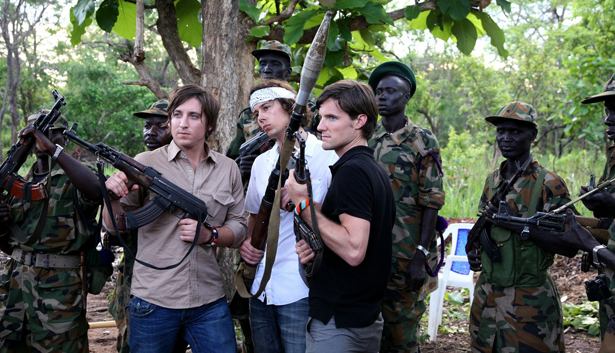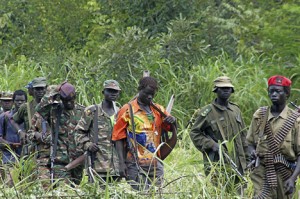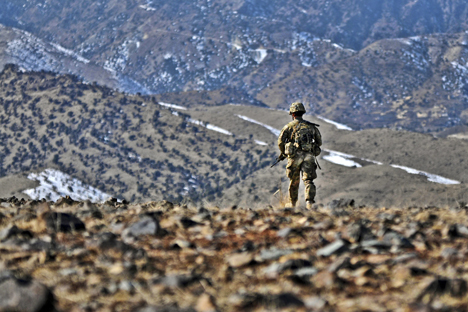March 24, 2012
By Mickey Friedman
If 80 million people had seen a short film I made about Joseph Kony, an African madman/dictator who kidnaps kids and makes them slaves and soldiers, sent me $30 bucks for a bracelet, then expected me to help them catch this maniac in some remote section of Sudan, well I, too, would probably run into the street in my underwear. And end up in the hospital.
To be absolutely clear, I hate African madmen/dictators who enslave kids and turn them into killing machines.
I watched the KONY2012 video at Fuel surrounded by people, so I didn’t openly weep. It’s difficult not to cry when you hear Jacob’s story, what happened to his family, his friends, to Uganda: “We worry the rebels when they arrest us again then they will kill us. My brother tried to escape. Then they killed him using a panga. They cut his neck … I saw.”
Jason Russell, the filmmaker, made Jacob a promise: “We are also going to do everything that we can to stop them … we’re going to stop them.”

The filmmakers from The Invisible Children with soldiers of Sudan People's Liberation Army - Photo, 2008, Glenna Gordon
The KONY2012 premise is simple. Everyone watches the film. Everyone learns Joseph Kony kidnaps children, and makes them accomplices as he murders the innocent. For $30, KONY2012 helps you spread the word with posters, stickers, and a bracelet. And the email addresses of influential Americans, popstars and politicians. Because up to now this wasn’t an important enough issue to American policymakers. Let’s make Joseph Kony more famous than George Clooney. And pressure the world into catching him.
People smarter than I am, more experienced in doing the day-to-day work of trying to stop the violence of The Lord’s Liberation army, have spoken about how the video simplifies what are clearly complicated political issues. Raising the sticky issues of implied racism. Is this a case of earnest well-to-do white Americans implying that Africans can’t resolve this problem without white American aid?
It could be that some of this may be true. Then the well-respected Nicholas Kristof weighed in at the New York Times, making the point that every humanitarian gesture ought to be respected, and that it can only be positive when young Americans feel the pain of others in the world.
But I’m annoyed by something else entirely. I’m annoyed not that Jason Russell cries for Africa, but that he’s not crying for America and for the innocent civilians, the children killed in the wars we’re fighting. American wars made possible in Iraq and Afghanistan by his taxes, your taxes, and my taxes. Wars encouraged and enabled by our inaction.
What happened to Jacob’s brother and to Jacob and to all the others who have died at the hands of Joseph Kony and his army is a crime. Jason Russell’s promise to Jacob is an honorable promise.
But I would feel a lot better if Jason Russell and all those who are purchasing stickers and bracelets would look closer to home.
After four tours of duty, Staff Sgt. Robert Bales murdered sixteen civilians, including nine children in Afghanistan. Staff Sgt. Bales will probably spend his life in prison and those sixteen people are gone. But really those deaths are on us. Staff Sgt. Bales was our emissary to Afghanistan, sent to defeat the Taliban and make life safe for us and ordinary Afghanis.
Deep down we know we have failed our soldiers. Deep down we know we have failed ordinary Afghanis. Sending Staff Sgt. Bales to war time and time again. Unwinnable wars in Iraq and then Afghanistan. To far distant places with different cultures, faiths, and different languages; to places he wasn’t wanted.
And what’s so very depressing are the lies of our leaders. Enough already with the excuses. With the fraudulent call to duty. Below the Reuters headline: “Panetta says massacre must not deter Afghan mission,” we read that Secretary of Defense Panetta told our soldiers in Afghanistan:
“We’ll be challenged by our enemy. We’ll be challenged by ourselves. We’ll be challenged by the hell of war itself. But none of that, none of that, must ever deter us from the mission that we must achieve.”
Secretary of State Hillary Clinton managed:
“Like many Americans, I was shocked and saddened by the killings of innocent Afghan villagers this weekend. This is not who we are and the U.S. is committed to seeing that those responsible are held accountable.”
She means Staff Sgt. Robert Bales, not herself, Leon Panetta, President Obama, Congress, and all the rest of us. She added that the incident does not change America’s steadfast dedication to protecting the Afghan people and to help build a strong and stable Afghanistan.
After four tours and the PTSD, shocked?
I don’t have a slogan as succinct as KONY2012 and I’m not sure what to put on the bracelet, but I sure as hell know if it’s time to stop Kony, it’s time to stop us.
_____________________________________________________________________________
A previous version of “Stop Kony. Stop Us” appeared in the March 23, 2012 issue of The Berkshire Record.
Here is some additional material if you want to learn more about these complicated issues.
Here’s the video produced by The Invisible Children for their KONY2012 campaign
:
KONY 2012 from INVISIBLE CHILDREN on Vimeo.
Here are excerpts from Nicholas Kristof’s column,
My starting point is a “bravo” for filmmakers for galvanizing young Americans to look up from their iPhones and seek to make a difference for villagers in central Africa who continue to be murdered, raped and mutilated by Kony and his Lord’s Resistance Army. Just in the last two months, the Lord’s Resistance Army has mounted 20 raids in Congo alone.
But nobody fights more wickedly than humanitarians, so there have been a series of attacks on the video. Let me try to address some of the criticisms.
Let Africans resolve their own problems. It’s neocolonialist for Americans to think that they can solve Congolese problems, when they can’t even solve their own. This is just one more example of “white man’s burden” imperialism.
When a warlord continues to kill and torture across a swath of Congo and Central African Republic, that’s not a white man’s burden. It’s a human burden.To me, it feels repugnant to suggest that compassion should stop at a national boundary or color line. A common humanity binds us all, whatever the color of our skin — or passport.
The issue is complicated, in ways that don’t come through in a misleading video. For example, the video doesn’t make clear that Kony is no longer a threat in Uganda.
The video doesn’t contain errors, but it does simplify things greatly to hold attention. Complexity is, er, complicated: It has been a leading excuse for inaction during atrocities — during the Armenian genocide, during the Holocaust, during Rwanda, during the Bosnian slaughter. Each episode truly was complicated, but, in retrospect, we let nuance paralyze us.
It’s true that Kony’s forces are diminished and no longer a danger in Uganda, but he remains a threat in Congo, Central African Republic and South Sudan. Those are tough neighborhoods — I’ve been held at gunpoint in Central African Republic and chased through the Congo jungle by a warlord whose massacres I interrupted — that rarely get attention and are little understood. Yes, the video glosses over details, but it has left the American public more informed. Last year, Rush Limbaugh defended the Lord’s Resistance Army because it sounded godly.
American kids worrying about Kony accomplish nothing. The video promotes feel-good gestures — wear a bracelet! — that enrich a do-nothing aid organization but have no benefit in the jungles of central Africa.
It’s true that indignation among Americans won’t by itself stop Kony. Yet I’ve learned over the years that public attention can create an environment in which solutions are more likely.
Public outrage over Serbian atrocities in the Balkans eventually led the Clinton administration to protect Kosovo and hammer out the Dayton peace accord. The Sudan civil war killed millions over half-a-century on and off, until public outrage — largely among evangelical Christians — led President George W. Bush to push successfully for a peace agreement in 2005.
I asked Anthony Lake, now the executive director of Unicef who was President Clinton’s national security adviser during the 1994 Rwandan genocide, whether a viral video about Rwanda would have made a difference then. “The answer is yes,” he said. He suggested that this kind of public attention would also have helped save more lives in Darfur and in Congo’s warring east.
In 1999, then-Secretary of State Madeleine Albright paid a brief visit to war-ravaged Sierra Leone and was photographed with a 3-year-old girl whose right arm had been chopped off. The photograph, widely circulated, helped galvanize outside powers to crush the militias. Sierra Leone is now at peace, and that girl is studying in the United States.
I asked Albright, who later led a task force on preventing genocide, what she thinks of the Kony video.
“Shining a light makes a lot of difference,” she said, adding that Kony’s prospects are probably less good now than before the video came out.The bottom line is: A young man devotes nine years of his life to fight murder, rape and mutilation, he produces a video that goes viral and galvanizes mostly young Americans to show concern for needy villagers abroad — and he’s vilified?
I don’t know if this initiative will make a difference. But if I were a Congolese villager, I would welcome these uncertain efforts over the sneering scorn of do-nothing armchair cynics.
And finally some excerpts from a response from Teju Cole, “The White Savior Industrial Complex” in The Atlantic
If we are going to interfere in the lives of others, a little due diligence is a minimum requirement.
A week and a half ago, I watched the Kony2012 video. Afterward, I wrote a brief seven-part response, which I posted in sequence on my Twitter account:
1- From Sachs to Kristof to Invisible Children to TED, the fastest growth industry in the US is the White Savior Industrial Complex.
2- The white savior supports brutal policies in the morning, founds charities in the afternoon, and receives awards in the evening.
3- The banality of evil transmutes into the banality of sentimentality. The world is nothing but a problem to be solved by enthusiasm.
4- This world exists simply to satisfy the needs—including, importantly, the sentimental needs—of white people and Oprah.
5- The White Savior Industrial Complex is not about justice. It is about having a big emotional experience that validates privilege.
6- Feverish worry over that awful African warlord. But close to 1.5 million Iraqis died from an American war of choice. Worry about that.
7- I deeply respect American sentimentality, the way one respects a wounded hippo. You must keep an eye on it, for you know it is deadly.These tweets were retweeted, forwarded, and widely shared by readers. They migrated beyond Twitter to blogs, Tumblr, Facebook, and other sites; I’m told they generated fierce arguments. As the days went by, the tweets were reproduced in their entirety on the websites of the Atlantic and the New York Times, and they showed up on German, Spanish, and Portuguese sites. A friend emailed to tell me that the fourth tweet, which cheekily name-checks Oprah, was mentioned on Fox television.
What Africa needs more pressingly than Kony’s indictment is more equitable civil society, more robust democracy, and a fairer system of justice.These sentences of mine, written without much premeditation, had touched a nerve. I heard back from many people who were grateful to have read them. I heard back from many others who were disappointed or furious. Many people, too many to count, called me a racist. One person likened me to the Mau Mau. The Atlantic writer who’d reproduced them, while agreeing with my broader points, described the language in which they were expressed as “resentment.”
This weekend, I listened to a radio interview given by the Pulitzer Prize-winning journalist Nicholas Kristof. Kristof is best known for his regular column in the New York Times in which he often gives accounts of his activism or that of other Westerners. When I saw the Kony 2012 video, I found it tonally similar to Kristof’s approach, and that was why I mentioned him in the first of my seven tweets.
Those tweets, though unpremeditated, were intentional in their irony and seriousness. I did not write them to score cheap points, much less to hurt anyone’s feelings. I believed that a certain kind of language is too infrequently seen in our public discourse. I am a novelist. I traffic in subtleties, and my goal in writing a novel is to leave the reader not knowing what to think. A good novel shouldn’t have a point.
But there’s a place in the political sphere for direct speech and, in the past few years in the U.S., there has been a chilling effect on a certain kind of direct speech pertaining to rights. The president is wary of being seen as the “angry black man.” People of color, women, and gays — who now have greater access to the centers of influence that ever before — are under pressure to be well-behaved when talking about their struggles. There is an expectation that we can talk about sins but no one must be identified as a sinner: newspapers love to describe words or deeds as “racially charged” even in those cases when it would be more honest to say “racist”; we agree that there is rampant misogyny, but misogynists are nowhere to be found; homophobia is a problem but no one is homophobic. One cumulative effect of this policed language is that when someone dares to point out something as obvious as white privilege, it is seen as unduly provocative. Marginalized voices in America have fewer and fewer avenues to speak plainly about what they suffer; the effect of this enforced civility is that those voices are falsified or blocked entirely from the discourse.
It’s only in the context of this neutered language that my rather tame tweets can be seen as extreme. The interviewer on the radio show I listened to asked Kristof if he had heard of me. “Of course,” he said. She asked him what he made of my criticisms. His answer was considered and genial, but what he said worried me more than an angry outburst would have:
There has been a real discomfort and backlash among middle-class educated Africans, Ugandans in particular in this case, but people more broadly, about having Africa as they see it defined by a warlord who does particularly brutal things, and about the perception that Americans are going to ride in on a white horse and resolve it. To me though, it seems even more uncomfortable to think that we as white Americans should not intervene in a humanitarian disaster because the victims are of a different skin color.Here are some of the “middle-class educated Africans” Kristof, whether he is familiar with all of them and their work or not, chose to take issue with: Ugandan journalist Rosebell Kagumire, who covered the Lord’s Resistance Army in 2005 and made an eloquent video response to Kony 2012; Ugandan scholar Mahmood Mamdani, one of the world’s leading specialists on Uganda and the author of a thorough riposte to the political wrong-headedness of Invisible Children; and Ethiopian-American novelist Dinaw Mengestu, who sought out Joseph Kony, met his lieutenants, and recently wrote a brilliant essay about how Kony 2012 gets the issues wrong. They have a different take on what Kristof calls a “humanitarian disaster,” and this may be because they see the larger disasters behind it: militarization of poorer countries, short-sighted agricultural policies, resource extraction, the propping up of corrupt governments, and the astonishing complexity of long-running violent conflicts over a wide and varied terrain.


